Unit 8 It must belong to Carla.Section A Grammar focus-4c情态动词归纳总结课件 (共28张PPT)
文档属性
| 名称 | Unit 8 It must belong to Carla.Section A Grammar focus-4c情态动词归纳总结课件 (共28张PPT) |  | |
| 格式 | pptx | ||
| 文件大小 | 1.9MB | ||
| 资源类型 | 教案 | ||
| 版本资源 | 人教新目标(Go for it)版 | ||
| 科目 | 英语 | ||
| 更新时间 | 2023-09-22 14:48:07 | ||
图片预览

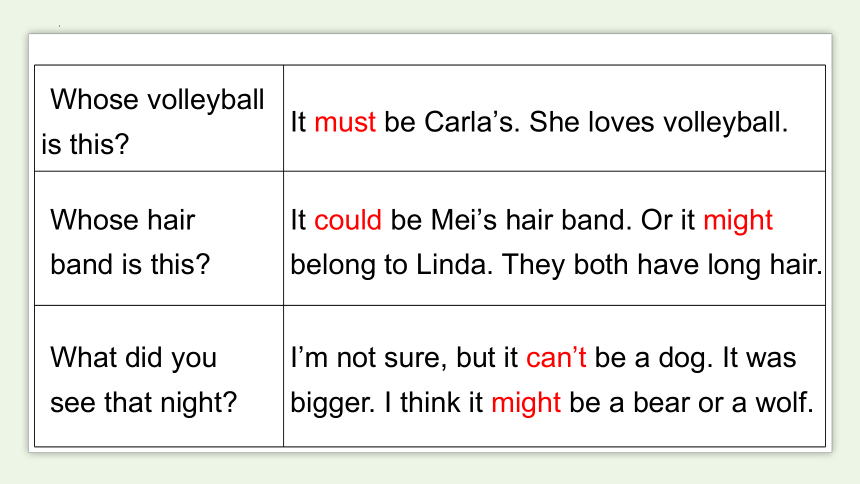
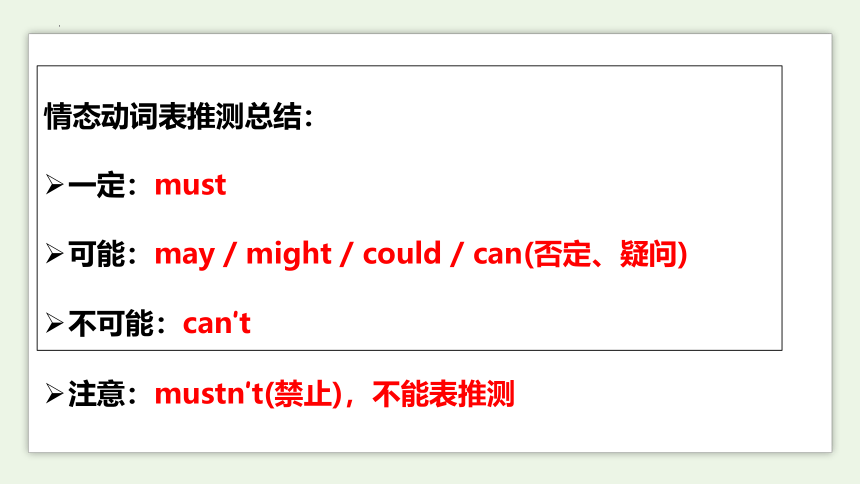
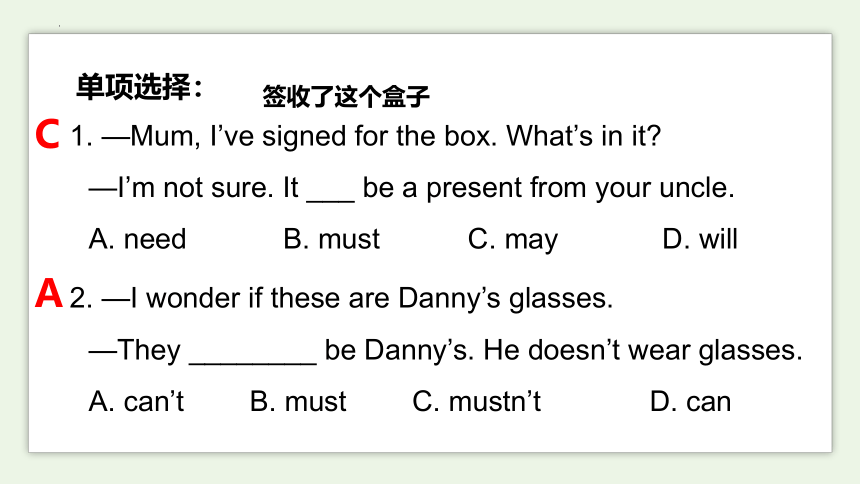
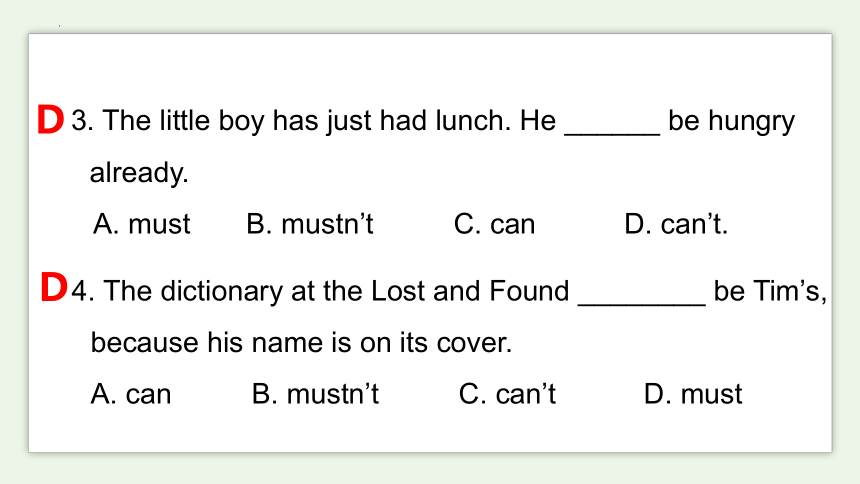
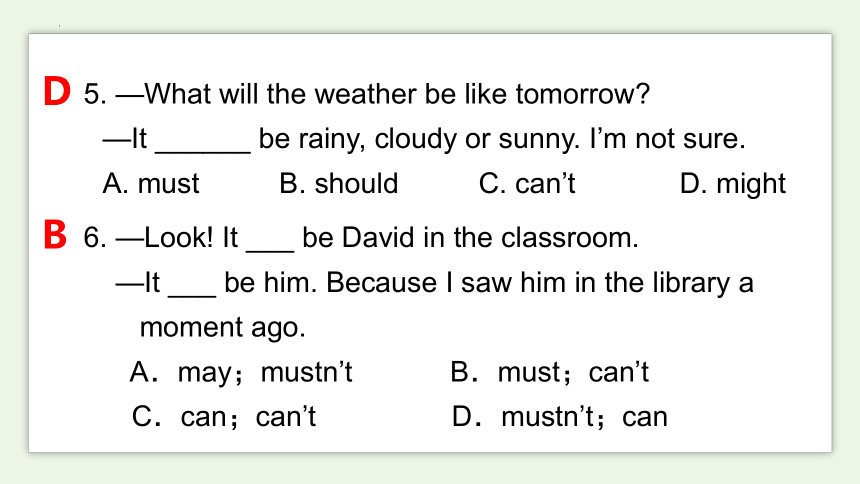
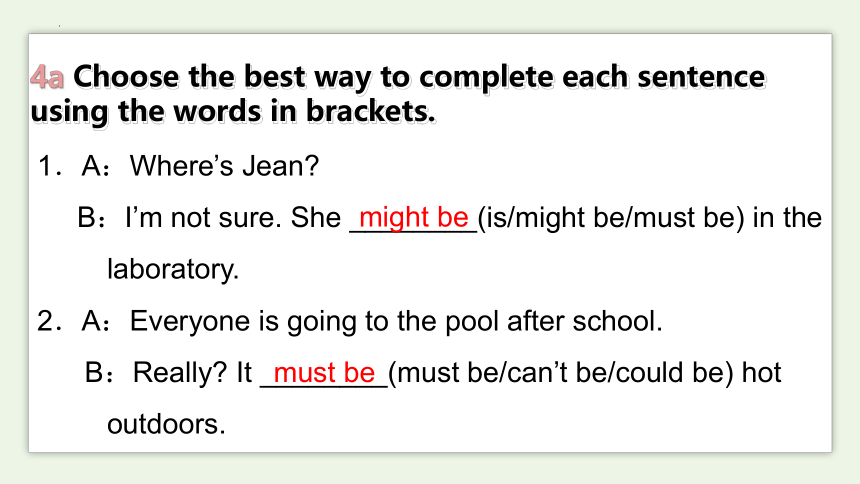
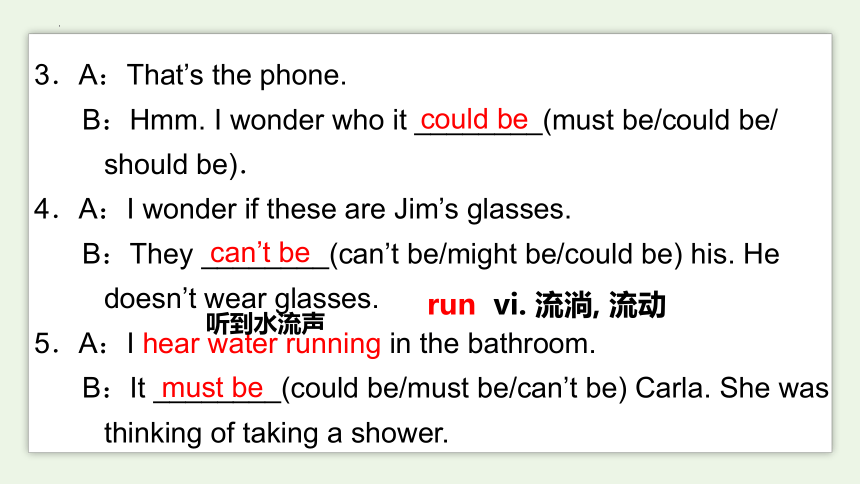
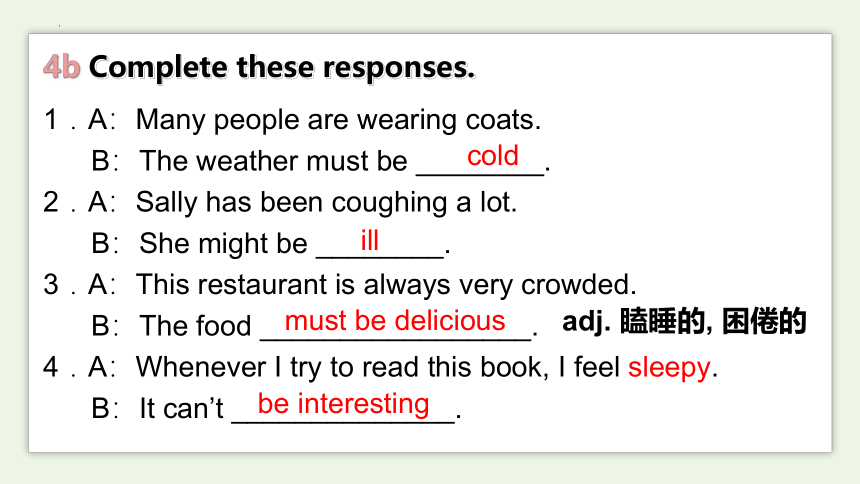
文档简介
(共28张PPT)
Grammar focus
It must belong to Carla.
Unit 8
Whose volleyball is this It must be Carla’s. She loves volleyball.
Whose hair band is this It could be Mei’s hair band. Or it might belong to Linda. They both have long hair.
What did you see that night I’m not sure, but it can’t be a dog. It was bigger. I think it might be a bear or a wolf.
情态动词表推测总结:
一定:must
可能:may / might / could / can(否定、疑问)
不可能:can’t
注意:mustn’t(禁止),不能表推测
1. —Mum, I’ve signed for the box. What’s in it
—I’m not sure. It ___ be a present from your uncle.
A. need B. must C. may D. will
C
单项选择:
签收了这个盒子
2. —I wonder if these are Danny’s glasses.
—They ________ be Danny’s. He doesn’t wear glasses.
A. can’t B. must C. mustn’t D. can
A
3. The little boy has just had lunch. He ______ be hungry already.
A. must B. mustn’t C. can D. can’t.
D
4. The dictionary at the Lost and Found ________ be Tim’s, because his name is on its cover.
A. can B. mustn’t C. can’t D. must
D
5. —What will the weather be like tomorrow
—It ______ be rainy, cloudy or sunny. I’m not sure.
A. must B. should C. can’t D. might
D
6. —Look! It ___ be David in the classroom.
—It ___ be him. Because I saw him in the library a
moment ago.
A.may;mustn’t B.must;can’t
C.can;can’t D.mustn’t;can
B
1.A:Where’s Jean
B:I’m not sure. She ________(is/might be/must be) in the laboratory.
2.A:Everyone is going to the pool after school.
B:Really It ________(must be/can’t be/could be) hot outdoors.
4a Choose the best way to complete each sentence using the words in brackets.
might be
must be
3.A:That’s the phone.
B:Hmm. I wonder who it ________(must be/could be/ should be).
4.A:I wonder if these are Jim’s glasses.
B:They ________(can’t be/might be/could be) his. He doesn’t wear glasses.
5.A:I hear water running in the bathroom.
B:It ________(could be/must be/can’t be) Carla. She was thinking of taking a shower.
could be
can’t be
must be
run vi. 流淌, 流动
听到水流声
1.A:Many people are wearing coats.
B:The weather must be ________.
2.A:Sally has been coughing a lot.
B:She might be ________.
3.A:This restaurant is always very crowded.
B:The food _________________.
4.A:Whenever I try to read this book, I feel sleepy.
B:It can’t ______________.
4b Complete these responses.
cold
ill
must be delicious
be interesting
adj. 瞌睡的, 困倦的
4c Look at this picture of a room. How much can you tell about the person who lives here Is it a boy or a girl What are his/her hobbies Discuss your ideas with a partner.
A:It could be a girl’s room because it’s very tidy.
B:I guess so. But it might be a boy’s room because the clothes look like boys’ clothes.
adj. 整洁的;vt. 整理
tide (up) a room 整理房间
15. run vi. 流淌;运行 vt. 经营 (run-ran-run-running)
Your nose is running.
Who left the tap running
The computer runs on electricity.
leave the tap running 没关水龙头
runs on electricity 靠电运行
run a company / business 经营公司 / 管理企业
你在流鼻涕。
谁没关水龙头?
这台电脑靠电运行。
Language points
We ran out of money.
Our water ran out.
The cat is running after the little mouse.
那只猫正在追赶那只小老鼠。
run out of sth.
= use up sth. = go through sth. 用完某物
sth. run out 某物用完
run after a bus = catch a bus 赶公交
Language points
16. sleepy adj. 瞌睡的;困倦的
He stayed up late last night and feels sleepy today.
他昨晚熬夜了,今天他感到困倦。
sleepy “瞌睡的,困倦的”,作表语或前置定语。 I am sleepy.
sleepy baby 打瞌睡的宝宝
sleeping “睡着的”,作前置定语。 sleeping baby 睡着的宝宝
sleeping bag 睡袋
asleep “睡着的”,作表语或后置定语,不作前置定语。 baby asleep 睡着的宝宝
fall asleep 入睡
Language points
lively adj. 生气勃勃的;(色彩)鲜艳的
He may be eighty, but he is still lively.
他可能已有八十岁,但是仍然充满朝气。
lively adj. 生动的,活泼的 lively characters 生动的人物
做前置定语 、表语
living adj. 活着的 all living things 所有生物
做前置定语、表语
alive adj. 活着的 The girl alive lives a happy life.
多用于人,与dead相对 My mother is still alive.
做后置定语,不作前置定语;可作表语
—Why are you looking ___ in class all day
—Because I can’t finish my homework until 12 every night. (连云港)
A.awake B.asleep
C.sleeping D.sleepy
D
做题前要先判断考查的情态v.的哪些用法:
推测、能力、请求许可、命令、劝告建议、祝愿…
1. 推测
肯定:must
可能:may / might / could / can(否定、疑问)
不可能:can’t (不能用mustn’t, 意为“禁止”)
注意:偶尔考到should表推测,表有将来较大可能实现的猜测,相当于be expected to。
--When can I come for the photos I need them tomorrow
--They ____ be ready by 12:00.
A. can B. should C. might D. need
2) It’s nearly seven o’clock. Jack ___ be here at any moment.
A. must B. need C. should D. could
注意:should表推测时可能性很大,所以推测较为具体确切。
2. 能力
区别:can / could / be able to
现在
过去的
现在、过去、将来的
抽象的
具体的;经过努力才能做成的
I can / could dance.
I was able to dance with Yiyang Qianxi in the party.
He will be able to enter the high school if he works hard.
They will __ run this machine on their own in three months.
A. can B. could C. may D. be able to
2) -- Have you got the results of the exam
-- No. All we ___ do now is to wait.
A. must B. can C. may D. could
3) -- I heard the fire spread very quickly through the hotel, but everyone ___ get out.
-- I can’t believe it.
A. had to B. could C. be able to D. would
3. 请求许可
注意一般疑问句的回答:may, might, can, could
--Might / May I come in
--Yes, you may / can.
--No, you can’t. (语气委婉)
--No, you mustn’t. (语气强硬)
--Could / Can I sit here
--Yes, you can / may.
--No, you can’t.
注意:回答不能用could!
--May I sit beside you, sir
--No, you ____. My girlfriend is coming soon.
A. can’t B. mustn’t C. needn’t D. shouldn’t
2) –I want to know if I ___ smoke here.
--No, you ___. Could you see the sign “NO SMOKING” there
A. can; needn’t B. must; can’t
C. shall; won’t D. may; mustn’t
否认请求许可时,mustn’t的语气比can’t更强硬。
4. 命令
must 必须 mustn’t 禁止
--Must I go to school today
--Yes, you must.
--No, you needn’t.
--No, you don’t have to.
注意must的一般疑问句的否定回答!
1) -- Must you go
--Yes, I’m afraid I really ____.
A. may B. should C. must D. can
2) Johnny, you _ play with the knife. You _ hurt yourself.
A. won’t; can’t B. mustn’t; may
C. shouldn’t; must D. can’t; shouldn’t
5. 劝告建议 should
Sir, you ____ be sitting in the waiting room. It is for women and children only.
A. shouldn’t B. can’t C. won’t D. needn’t
6. 祝愿
May you succeed! 祝你成功!
May + sb. + v. 原形!
= May you be successful!
6. 祝愿
May you succeed! 祝你成功!
= May you be successful!
May + sb. + v. 原形!
7. 过去习惯
辨别:would / used to
When we were children, we would go skating every winter.
(过去常常滑冰,现在滑不滑不知道)
He used to like you. (过去喜欢,现在不喜欢)
He used to be a quiet boy. (过去是,现在不是)
注意:used to可表过去动作或状态,would一般只表动作;若强调过去与现在的对比,用used to
Thank you!
Grammar focus
It must belong to Carla.
Unit 8
Whose volleyball is this It must be Carla’s. She loves volleyball.
Whose hair band is this It could be Mei’s hair band. Or it might belong to Linda. They both have long hair.
What did you see that night I’m not sure, but it can’t be a dog. It was bigger. I think it might be a bear or a wolf.
情态动词表推测总结:
一定:must
可能:may / might / could / can(否定、疑问)
不可能:can’t
注意:mustn’t(禁止),不能表推测
1. —Mum, I’ve signed for the box. What’s in it
—I’m not sure. It ___ be a present from your uncle.
A. need B. must C. may D. will
C
单项选择:
签收了这个盒子
2. —I wonder if these are Danny’s glasses.
—They ________ be Danny’s. He doesn’t wear glasses.
A. can’t B. must C. mustn’t D. can
A
3. The little boy has just had lunch. He ______ be hungry already.
A. must B. mustn’t C. can D. can’t.
D
4. The dictionary at the Lost and Found ________ be Tim’s, because his name is on its cover.
A. can B. mustn’t C. can’t D. must
D
5. —What will the weather be like tomorrow
—It ______ be rainy, cloudy or sunny. I’m not sure.
A. must B. should C. can’t D. might
D
6. —Look! It ___ be David in the classroom.
—It ___ be him. Because I saw him in the library a
moment ago.
A.may;mustn’t B.must;can’t
C.can;can’t D.mustn’t;can
B
1.A:Where’s Jean
B:I’m not sure. She ________(is/might be/must be) in the laboratory.
2.A:Everyone is going to the pool after school.
B:Really It ________(must be/can’t be/could be) hot outdoors.
4a Choose the best way to complete each sentence using the words in brackets.
might be
must be
3.A:That’s the phone.
B:Hmm. I wonder who it ________(must be/could be/ should be).
4.A:I wonder if these are Jim’s glasses.
B:They ________(can’t be/might be/could be) his. He doesn’t wear glasses.
5.A:I hear water running in the bathroom.
B:It ________(could be/must be/can’t be) Carla. She was thinking of taking a shower.
could be
can’t be
must be
run vi. 流淌, 流动
听到水流声
1.A:Many people are wearing coats.
B:The weather must be ________.
2.A:Sally has been coughing a lot.
B:She might be ________.
3.A:This restaurant is always very crowded.
B:The food _________________.
4.A:Whenever I try to read this book, I feel sleepy.
B:It can’t ______________.
4b Complete these responses.
cold
ill
must be delicious
be interesting
adj. 瞌睡的, 困倦的
4c Look at this picture of a room. How much can you tell about the person who lives here Is it a boy or a girl What are his/her hobbies Discuss your ideas with a partner.
A:It could be a girl’s room because it’s very tidy.
B:I guess so. But it might be a boy’s room because the clothes look like boys’ clothes.
adj. 整洁的;vt. 整理
tide (up) a room 整理房间
15. run vi. 流淌;运行 vt. 经营 (run-ran-run-running)
Your nose is running.
Who left the tap running
The computer runs on electricity.
leave the tap running 没关水龙头
runs on electricity 靠电运行
run a company / business 经营公司 / 管理企业
你在流鼻涕。
谁没关水龙头?
这台电脑靠电运行。
Language points
We ran out of money.
Our water ran out.
The cat is running after the little mouse.
那只猫正在追赶那只小老鼠。
run out of sth.
= use up sth. = go through sth. 用完某物
sth. run out 某物用完
run after a bus = catch a bus 赶公交
Language points
16. sleepy adj. 瞌睡的;困倦的
He stayed up late last night and feels sleepy today.
他昨晚熬夜了,今天他感到困倦。
sleepy “瞌睡的,困倦的”,作表语或前置定语。 I am sleepy.
sleepy baby 打瞌睡的宝宝
sleeping “睡着的”,作前置定语。 sleeping baby 睡着的宝宝
sleeping bag 睡袋
asleep “睡着的”,作表语或后置定语,不作前置定语。 baby asleep 睡着的宝宝
fall asleep 入睡
Language points
lively adj. 生气勃勃的;(色彩)鲜艳的
He may be eighty, but he is still lively.
他可能已有八十岁,但是仍然充满朝气。
lively adj. 生动的,活泼的 lively characters 生动的人物
做前置定语 、表语
living adj. 活着的 all living things 所有生物
做前置定语、表语
alive adj. 活着的 The girl alive lives a happy life.
多用于人,与dead相对 My mother is still alive.
做后置定语,不作前置定语;可作表语
—Why are you looking ___ in class all day
—Because I can’t finish my homework until 12 every night. (连云港)
A.awake B.asleep
C.sleeping D.sleepy
D
做题前要先判断考查的情态v.的哪些用法:
推测、能力、请求许可、命令、劝告建议、祝愿…
1. 推测
肯定:must
可能:may / might / could / can(否定、疑问)
不可能:can’t (不能用mustn’t, 意为“禁止”)
注意:偶尔考到should表推测,表有将来较大可能实现的猜测,相当于be expected to。
--When can I come for the photos I need them tomorrow
--They ____ be ready by 12:00.
A. can B. should C. might D. need
2) It’s nearly seven o’clock. Jack ___ be here at any moment.
A. must B. need C. should D. could
注意:should表推测时可能性很大,所以推测较为具体确切。
2. 能力
区别:can / could / be able to
现在
过去的
现在、过去、将来的
抽象的
具体的;经过努力才能做成的
I can / could dance.
I was able to dance with Yiyang Qianxi in the party.
He will be able to enter the high school if he works hard.
They will __ run this machine on their own in three months.
A. can B. could C. may D. be able to
2) -- Have you got the results of the exam
-- No. All we ___ do now is to wait.
A. must B. can C. may D. could
3) -- I heard the fire spread very quickly through the hotel, but everyone ___ get out.
-- I can’t believe it.
A. had to B. could C. be able to D. would
3. 请求许可
注意一般疑问句的回答:may, might, can, could
--Might / May I come in
--Yes, you may / can.
--No, you can’t. (语气委婉)
--No, you mustn’t. (语气强硬)
--Could / Can I sit here
--Yes, you can / may.
--No, you can’t.
注意:回答不能用could!
--May I sit beside you, sir
--No, you ____. My girlfriend is coming soon.
A. can’t B. mustn’t C. needn’t D. shouldn’t
2) –I want to know if I ___ smoke here.
--No, you ___. Could you see the sign “NO SMOKING” there
A. can; needn’t B. must; can’t
C. shall; won’t D. may; mustn’t
否认请求许可时,mustn’t的语气比can’t更强硬。
4. 命令
must 必须 mustn’t 禁止
--Must I go to school today
--Yes, you must.
--No, you needn’t.
--No, you don’t have to.
注意must的一般疑问句的否定回答!
1) -- Must you go
--Yes, I’m afraid I really ____.
A. may B. should C. must D. can
2) Johnny, you _ play with the knife. You _ hurt yourself.
A. won’t; can’t B. mustn’t; may
C. shouldn’t; must D. can’t; shouldn’t
5. 劝告建议 should
Sir, you ____ be sitting in the waiting room. It is for women and children only.
A. shouldn’t B. can’t C. won’t D. needn’t
6. 祝愿
May you succeed! 祝你成功!
May + sb. + v. 原形!
= May you be successful!
6. 祝愿
May you succeed! 祝你成功!
= May you be successful!
May + sb. + v. 原形!
7. 过去习惯
辨别:would / used to
When we were children, we would go skating every winter.
(过去常常滑冰,现在滑不滑不知道)
He used to like you. (过去喜欢,现在不喜欢)
He used to be a quiet boy. (过去是,现在不是)
注意:used to可表过去动作或状态,would一般只表动作;若强调过去与现在的对比,用used to
Thank you!
同课章节目录
- Unit 1 How can we become good learners.
- Section A
- Section B
- Unit 2 I think that mooncakes are delicious!
- Section A
- Section B
- Unit 3 Could you please tell me where the restroom
- Section A
- Section B
- Unit 4 I used to be afraid of the dark.
- Section A
- Section B
- Unit 5 What are the shirts made of?
- Section A
- Section B
- Review of Units 1-5
- Unit 6 When was it invented?
- Section A
- Section B
- Unit 7 Teenagers should be allowed to choose their
- Section A
- Section B
- Unit 8 It must belong to Carla.
- Section A
- Section B
- Unit 9 I like music that I can dance to.
- Section A
- Section B
- Unit 10 You're supposed to shake hands.
- Section A
- Section B
- Review of Units 6-10
- Unit 11 Sad movies make me cry.
- Section A
- Section B
- Unit 12 Life is full of the unexpected
- Section A
- Section B
- Unit 13 We're trying to save the earth!
- Section A
- Section B
- Unit 14 I remember meeting all of you in Grade 7.
- Section A
- Section B
- Review of Units 11-14
